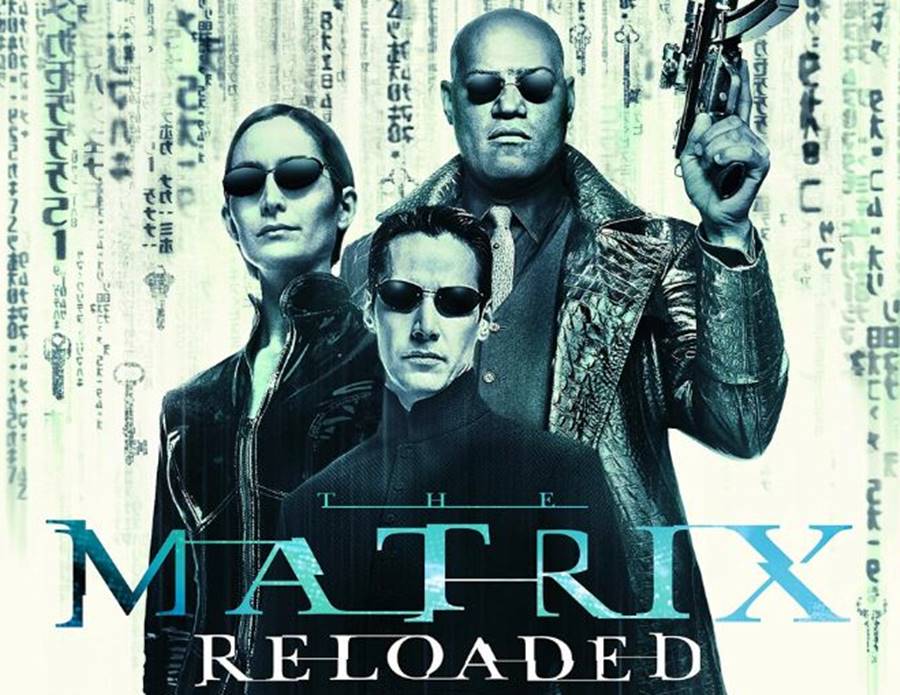
By Jae-Ha Kim
Chicago Sun-Times
May 11, 2003
“No one can be told what the Matrix is. You have to see it for yourself,” Morpheus says in “The Matrix” (1999).
Four years later, the world is ready to feast its collective eyes on “The Matrix Reloaded”–the first of two sequels that have already been filmed.
Given the success of “The Lord of the Rings” franchise, which shot all three of its films simultaneously, shooting two sequels at the same time doesn’t seem to be as much of a gamble these days. “The Matrix” grossed $459 million worldwide and is all but guaranteed the No. 1 spot on its opening weekend.
With the final sequel, “The Matrix Revolutions,” still left to edit, film editor Zach Staenberg doesn’t have closure on this project quite yet. Much
of the cast and crew worked over a 270-day stretch from 2001 to 2002, with seasonal hiatuses penciled in.
But Staenberg, who won an Oscar for his editing on “The Matrix,” opted to work straight through most of the days off.
“It’s not that I’m a selfless person,” he said, laughing. “There’s just so much to do when you’re dealing with a film like this.”
Which is why many of his seasoned colleagues regard him with awe.
“The one person who has more to do with the success of these movies–other than [filmmakers] Andy and Larry Wachowski–is Zach,” said Don Davis, the composer who has scored all the “Matrix” films. “He was there for every moment of the shoot. He was involved with the brothers in planning what would be shot and how it would logistically be put together. He kept everything straight and never seemed to be confused by any of the chaos.”
Though filming two complicated, action movies simultaneously would seem to be confusing for anyone, the parties involved say the preparations were so meticulous that it wasn’t too difficult to keep track of who said what when.
Keanu Reeves, who plays Neo, told Time magazine: “The first [film] was about birth. The second one is life. The third is death.”
In the sequels, Neo has to persuade the machines in the Matrix to set the humans of the real world free. Most of “Reloaded” takes place in the netherworld of the Matrix, while “Revolutions” promises to be set in the darker real world.
“I didn’t get confused about which [sequel] I was doing a scene for because the brothers were painstakingly clear about what had just happened and what was coming up,” said former Chicago-based actor Harry J. Lennix, who portrays Lock in both sequels. “They took great pain to keep us in the loop about what was going on, which made it easier for everyone. If you read the scripts–and they gave us separate ones for each movie–you knew exactly what was going on.”
Speaking of the scripts, each page was watermarked with the actors’ names on them–the better to trace back to whomever might to sell the contraband on, let’s say, eBay.
Staenberg admits that while the cast may have been fooled by the seemingly seamless operation, even he at times was unnerved by the magnitude of the $300 million project.
“It was a grueling process at times, but [the brothers] and I planned and plotted the sequels out the best we could,” he said. “Every now and then I needed to get an explanation from them on the internal workings of a scene, but over all, it went pretty smoothly.”
Once he finishes editing “Revolutions,” Staenberg has another “Matrix” project on his wish list. He’d like to take the two sequels and turn them into a four-hour feature-length DVD.
“Truthfully, ‘Reloaded’ and ‘Revolutions’ are one movie if you take off the tail credits of one film and the opening credits of the other and splice them together,” he said.
“Even releasing them as two sequels, I always felt we were working on a four-hour movie, and I’m going to try to make that happen down the line.”
Unlike most of the cast and crew that worked on both sequels at the same time, the composer got to work on each separately.
“Composers generally are involved after the filming process is over, so I’ve only now started working on the second sequel [‘The Matrix Revolutions’],” he said. “Film music is a medium that is married to a visual, not a script. So you really don’t want to write music until you know how the directors are treating a scene and what the pace is. Then you have an idea of how you want to approach a sequence.”
Though he didn’t have to worry about creating beautiful music for “Revolutions” until recently, Davis did have to keep in mind he also would be scoring “The Animatrix”–nine anime films that serve as prequels to “The Matrix” mythology–and “Enter the Matrix,” the highly anticipated first video game of the franchise.
Davis composed more than seven hours of music for “The Matrix” franchise. Forty of those minutes are featured on the two-disc soundtrack of the first sequel, “The Matrix Reloaded,” which also includes contributions from the Dave Matthews Band, P.O.D. and Marilyn Manson.
“The stress level was high on this movie, but anything I felt–or the film editor or sound designer felt–was much higher for [filmmakers] Larry and Andy [Wachowski],” he said. “They supervised everything.
“They are perfectionists who don’t leave any stones unturned, and you’ll see that in the quality of this film. No one is more excited than me about its release and I can promise you right now that you will not be disappointed.”
Like many of the behind-the-scenes players on this film, Davis first worked with the Wachowski brothers on “Bound” (1996), which essentially was a test film for Warner Bros. before the studio gave them the go-ahead to make “The Matrix.”
Though “Bound” wasn’t a box-office smash, critics loved the dark film and the brothers’ fresh approach to filmmaking.
“After working on ‘Bound,’ I was confident they could pull off [the first ‘Matrix’ film] because I knew what they were capable of,” Davis said. “[On ‘Bound’] they were flying by the seat of their pants. But what a pair of pants.”
Linkin Park–“Session”
Marilyn Manson–“This Is the New S—”
Rob Zombie–“Reload”
Rob Dougan–“Furious Angels” (instrumental)
Deftones–“Lucky You”
Team Sleep–“The Passportal”
P.O.D.–“Sleeping Awake”
Unloco–“Bruises”
Rage Against the Machine–“Calm Like a Bomb”
Oakenfold–“Dread Rock”
Fluke–“Zion”
Dave Matthews Band–“When the World Ends” (Oakenfold remix)
DISC 2
Don Davis–“Main Title”
Don Davis–“Trinity Dream”
Juno Reactor–“Tea House”
Rob Dougan–“Chateau”
Juno Reactor–“Mona Lisa Overdrive”
Don Davis vs. Juno Reactor–“Burly Brawl”
Don Davis–“Reloaded Suite”





